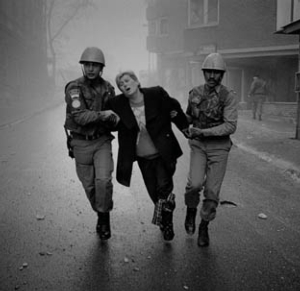A ghost can gain body and words - especially words. Jennie Erdal, who spent ten years ghosting for a flamboyant publisher, has now struck out with a memoir of herself in her own words. And she shows that her love affair with words - writing letters, columns and novels for her paymaster - enables her to triumph in this book of elegance and insight. Tiger is a larger-than-life writer who can't write. A rich publisher whose own books are at the centre of his success, he had no words himself they were conveniently and skilfully coaxed out of Erdal by cheques and chatter. Tiger was "a jungle bird in human form". He was outrageous, demanding, domineering, unreasonable, impulsive, affectionate and he knew what he wanted to write, but only his ghost could do it for him. Whether it was tabloid newspaper columns or an influential book of interviews with prominent women or sensual novels, Erdal would do it not always easily, for she cares for literature.
He establishes a big presence at the Frankfurt Book Fair, he wines and dines those who are influential, he has a grand residence in the Dordogne. After twenty years of such success based on the wordcraft of Erdal financial nemesis stares him in the face. A last suggestion, which Tiger hopes will be their salvation, was a "big book on God"; Erdal then knew it was definitely time to part.
She had learnt of the dangers of God as a child in Fife, when she was given dire warning that the Papes and Prods should never meet. As a Prod she was seduced into looking at the beautiful white dress for a Catholic's first communion: she was beaten for the dangerous contact. The influence is lasting: "Religion, like bad grammar, is generally a habit picked up in childhood." She hated going weekly with her mother to their private pew, loathed the drone from the pulpit and the joyless atmosphere.
Her parents wanted her do well in the world and she was taken to elocution lessons where she learnt and never forgot that words are power. When her uncle with a thick Scottish accent visited the family, language took on a lively richness and she learnt that to own the language was essential for a writer. Her writing debut was as a translator of a Russian thriller and there is a connection between this selfeffacing task and her role as an invisible writer. Erdal reflects with great interest on the art of writing and especially how to write a novel, when the subject and plot are dictated by your employer who has bizarre ideas such as a plot about the possibility that two women should have simultaneous orgasms in different parts of the world.
What are the ethics of ghosting? Is it a form of prostitution? Surely it is a straightforward exchange: money for work like that of a bank clerk or a cleaner? Well, the relationship was never straightforward, but it enabled her to support a family for 20 years. It brings strange and irksome situations, such as telephone calls at all hours of the day and night to enquire about progress or being questioned at a book launch about what you think of the book you have effectively written. Even in ghosting there is the "terrible bleakness of the creative process", without the reward of being praised for your work.
Erdal is struck by the casualness of events, the randomness of life, which is why we try to make a narrative of lives. We find it difficult to believe that everything is chance and the longing of the human being to understand the world is "powerful and urgent". So we make meaning and even Montaigne, whom she quotes, has no explanation for his love of Boétie except "parce que c'était moi, parce que c'était lui".
Erdal warns that autobiographies are unreliable; they want to hide the pain. But this memoir is constantly reliable in bringing us an enjoyable story, with a light and sometimes humorous touch. The ghost has acquired flesh and a voice an enchanting and enlightening voice.
Ghosting is available from Amazon (UK)

